Simulation reveals what it means to make do with less
By Rochelle Moore
Published in News on May 2, 2018 8:58 AM
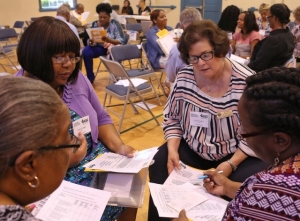
News-Argus/CASEY MOZINGO
Doris Smith, Beatrice Murray, Bonnie Kornegay and Vandora Barrett discuss which items they can pawn to be able to pay their monthly expenses during a demonstration that simulates what it's like to live in poverty Tuesday at First Presbyterian Church.
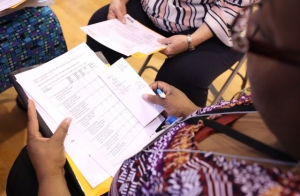
News-Argus/CASEY MOZINGO
A group makes a list of the monthly expenses to see how they can make payments during a demonstration that simulates what it's like to live in poverty Tuesday at First Presbyterian Church.
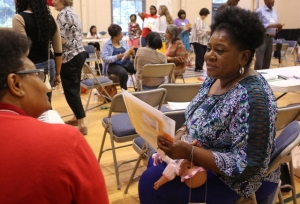
News-Argus/CASEY MOZINGO
Pamela Ruffin makes a stop to see her options for child care in a demonstration that simulates what it's like to live in poverty Tuesday at First Presbyterian Church.
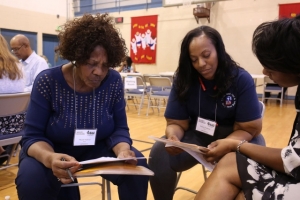
News-Argus/CASEY MOZINGO
Christine Hubbard, Luchana Artis and Naisha Coley read the instructions for their group's characters during a demonstration that simulates what it's like to live in poverty Tuesday at First Presbyterian Church. Their family is made up of a 34-year-old single mother with two children.
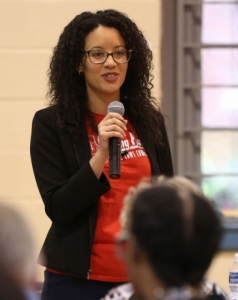
News-Argus/CASEY MOZINGO
Krystina Dillard with North Carolina Community Action Association gives statistics to the groups before they begin the activity Tuesday at First Presbyterian Church.
One in four people in Goldsboro are living in poverty.
In Wayne County, with one in five people living in poverty, the reality is similar.
And, perhaps more staggering are the poverty statistics for African-American children -- 53 percent in the city and 44 percent in the county exist in poverty.
"One in two African-American youth live in poverty here in Goldsboro," said Krystina Dillard, training coordinator with the N.C. Community Action Association.
"You have striking poverty here in your community," she said.
Dillard spoke during a poverty simulation exercise at First Presbyterian Church Tuesday.
In fact, Wayne County is among the five most-impoverished areas of the state, based on income data and U.S. Census reports, Dillard said.
Individuals who make less than $12,000 a year, and a family of four making less than $24,600 are considered poor, according to federal poverty guidelines.
"As a state, we have a lot of work to do to bring people out of poverty," she said.
Dillard offered a glimpse of conditions people are facing each day in the nation, state and Wayne County, just prior to starting the poverty simulation exercise that involved real-life scenarios for members of the community.
The event, hosted by the Wayne Action Group for Economic Solvency (WAGES), in collaboration with the N.C. Community Action Association, drew people from a variety of agencies, nonprofits, local government, business and the community.
The event involved each person being assigned an identity before moving from station to station where they tried to get a job, pay their bills and juggle the responsibilities of being a parent. They also stopped by a pawn shop to sell personal items, just to make ends meet.
They were mothers, fathers, wives, husbands and parents, each given a variety of challenges that people living in poverty face every day. Each person went through the simulation, which was set up to allow people to experience what it's like to be poor an entire month.
The simulation was offered to provide people with issues others face on a regular basis in the Wayne County area.
"This is giving people the day in the life of what people in poverty are experiencing in our community over a four-week cycle," aid Patricia Beier, WAGES executive director.
"We're trying to bring awareness to issues related to poverty in our community because WAGES not only provides services and opportunities for services but also advocacy and awareness. It's very relevant because of the poverty report that was just released in January and also because poverty is very prevalent in our community."
The different stations each person worked through included a utility company where bills were paid, a mortgage company, the Department of Social Services, interfaith agencies, a store, bank, public school, employer, community action agency, pawn shop and quik cash.
Bonnie Kornegay, technical services manager at the Wayne County Public Library, said the experience helped open her eyes to the struggles people face. At the library, she often helps residents who need to learn how to use a computer to look for a job, create a resume and apply for a job. Many people asking for help lack the resources to have a home computer, which is needed in today's job market with most employers accepting applications online.
"So many people we see in the library come from all walks of life, and many of them are disadvantaged and underprivileged," Kornegay said. "It's important to us to understand that these services we're providing them are necessary for their livelihood to apply for jobs, to get assistance and to further their education.
"In order to help them, you need to understand the situations they're living in and this experience today has opened my eyes and it's given me an opportunity to walk in their shoes."
Many people involved in the simulation already work with the poor, either by connecting them to services or by helping them find ways to become self-sufficient.
Sharon Goodson, executive director of the N.C. Community Action Association, said the poverty simulation was an opportunity to help members of the community become even better at their work.
"We don't want people to lose their sensitivity or compassion for your most vulnerable people," Goodson said. "We want people to bring their A game every day to their work because people's lives depend on them.
"We have the right people in the room today. We have some compassionate and dedicated people in the room and I believe people can continue to grow."
The event was held as part of the local observance of Community Action Month, which is recognized nationwide in May.
Community action agencies, including WAGES, started in the 1960s as part of former president Lyndon B. Johnson's war on poverty, Beier said. Community action agencies work to empower the poor, with the goal of helping people become self-sufficient.
